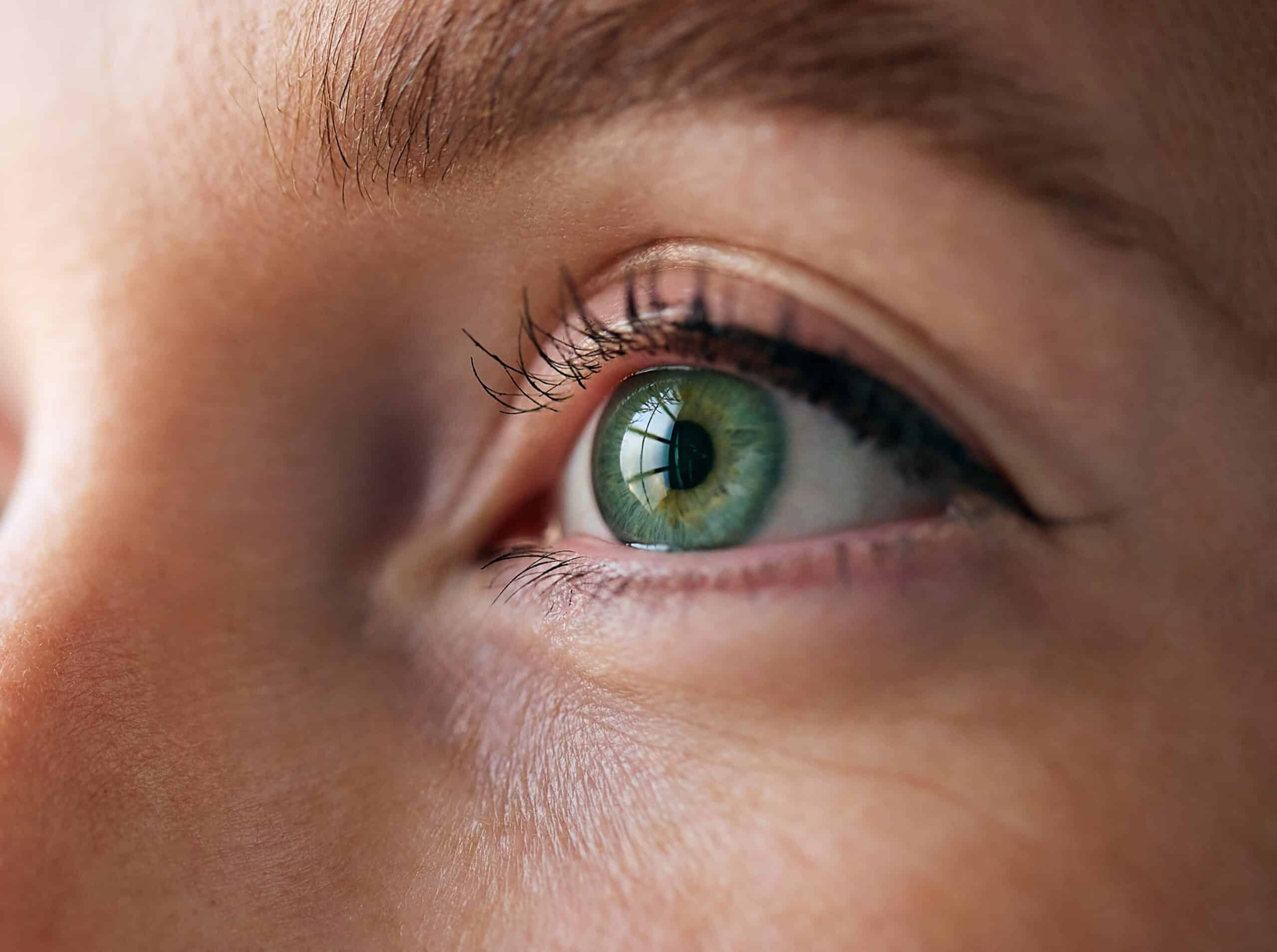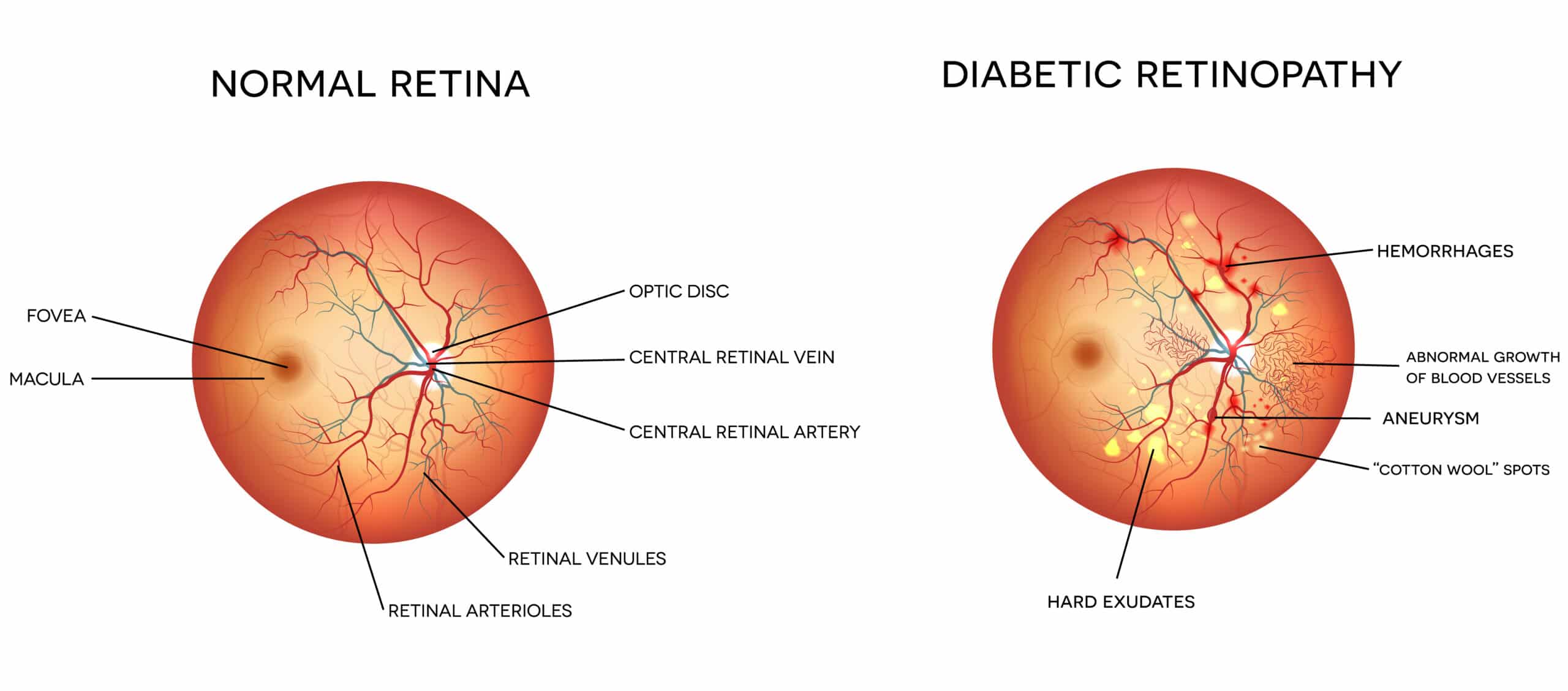
Your retina is one of the most important parts of your eye, yet many people don’t fully understand what it does or how to protect it. At Florida Eye Microsurgical Institute, our retinal specialists combine decades of experience with patient education to help you make informed decisions about your eye health.
The retina is a thin layer of tissue that lines the back wall of your eye and contains millions of light-sensitive cells called photoreceptors. When light enters your eye, these cells convert it into electrical signals that travel through the optic nerve to your brain, where they’re interpreted as the images you see.
The retina has several important parts, but the most critical is the macula, which is a small area in the center of your retina responsible for sharp, detailed central vision. The macula allows you to read, drive, recognize faces, and perform other activities that require fine visual detail.
The rest of your retina provides peripheral (side) vision, which helps you navigate your environment safely.
At Florida Eye Microsurgical Institute, we see and treat a wide range of retinal disorders every day. The most common retinal conditions include:
Age-related macular degeneration (AMD) is the leading cause of vision loss in people over 50. This condition affects the macula, causing central vision to become blurry or distorted while peripheral vision remains intact.
There are two types: dry AMD, which progresses slowly, and wet AMD, which can cause rapid vision loss but is treatable with injections and other therapies.
For wet AMD, our specialists use anti-VEGF injections such as Lucentis, which can dramatically reduce swelling and prevent further vision loss. We also emphasize the importance of nutritional support through the scientifically proven AREDS formula of vitamins and minerals.
This specialized combination of antioxidants and zinc has been shown to slow the progression of dry AMD, though it cannot restore vision already lost. Our specialists will determine if these supplements are appropriate for your specific condition and stage of disease.

This condition affects people with diabetes when high blood sugar levels damage the blood vessels in the retina. In its early stages, diabetic retinopathy may cause no symptoms, which is why regular eye exams are essential for those with diabetes. As it progresses, it can cause bleeding, swelling, and ultimately severe vision loss if left untreated.
For diabetic retinopathy, early intervention is critical to preventing vision loss. We work closely with patients from the moment of their diabetes diagnosis to monitor retinal health and intervene before significant damage occurs. Our treatment options include laser therapy to seal leaking blood vessels, anti-VEGF injections to reduce swelling, and advanced surgical techniques when necessary.
Our eye doctors will work in partnership with your endocrinologist or primary care provider to manage your overall health.

A retinal detachment occurs when the retina separates from the underlying tissue that nourishes it. This is a medical emergency that requires immediate treatment to prevent permanent vision loss. Warning signs include sudden flashes of light, an increase in floaters, or a shadow or curtain appearing in your field of vision.
Retinal detachment requires immediate emergency treatment to prevent permanent blindness. We maintain emergency protocols to see patients with symptoms like flashing lights, sudden floaters, or a curtain-like shadow in their vision as quickly as possible, often the same day.
Surgical options include:
Pneumatic Retinopexy: A minimally invasive procedure where a special gas bubble is injected into the eye to push the retina back into place and seal the tear.
Scleral Buckle Surgery: This procedure involves placing a flexible silicone band around the eye to support the retina while it heals, often combined with drainage of fluid from beneath the detached area.
Vitrectomy Surgery: The most comprehensive approach, removing the vitreous gel and replacing it with a gas bubble that gradually gets replaced by your body’s natural fluids.

Protecting your retinal health is a partnership between you and your eye care team. Here are key steps you can take:
Schedule Regular Eye Exams
If you’re over 50, have diabetes, or have a family history of eye disease, annual comprehensive eye exams are essential for early detection.
Know Your Risk Factors
Age, family history, smoking, high blood pressure, and diabetes all increase your risk for retinal problems.
Recognize Warning Signs
Changes in your vision, such as straight lines appearing wavy, difficulty seeing details, dark spots in your central vision, or decreased color perception, warrant immediate attention.
Maintain Overall Health
Controlling diabetes, blood pressure, and cholesterol, along with not smoking, significantly reduces your risk of retinal disease.
Protect Your Eyes
Wear sunglasses with UV protection and safety eyewear when appropriate to prevent injury-related retinal problems.
At Florida Eye Microsurgical Institute, our retinal specialists combine cutting-edge technology with compassionate, personalized care. Our specialists take the time to thoroughly explain your condition, discuss all treatment options, and work with you to develop a care plan that fits your unique needs and lifestyle.
We understand that vision problems can be frightening, and we’re here to guide you through every step of your treatment journey. It’s important to remember that early detection and treatment offer the best chance of preserving your vision.
If you're experiencing any changes in your vision or are due for your regular eye exam, schedule an appointment at Florida Eye Microsurgical Institute in Boca Raton, FL, today.